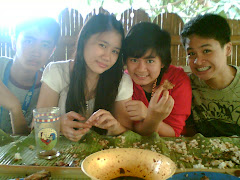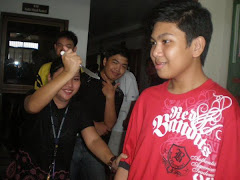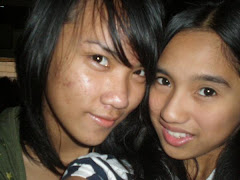.M-u-t-a-t-i-o-n.
Genetics is the study of genes. As I have studied it, it is all about heredity and what you are made of in a deeper and more interesting, complex sense and what your offspring would be. Of all our topics in genetics, the one that caught my interest most is mutation.
Mutation is any change in the gene or chromosome of an organism. Mutation is sometimes mixed up with the idea of cancer. However, there is a difference between the two concepts. Cancer, is caused by carcinogens (chemicals, radiation, pollution, toxins and the like), and is not inheritable or can’t be passed to the next offspring. On the other hand, mutation is caused by mutagens (chemicals, radiation, radioactive elements, UV rays and the like), and is inheritable or can be passed to the next offspring. Mutation could be spontaneous which is natural, or induced, which is artificial.
Chromosomal aberrations, which are changes in the genetic material that usually shows unwanted characteristics is a mutation. Chromosomal mutations could either be Point mutation or the changes in chromosome structure, or Frame- Shift mutation or the changes in chromosome number.
Point mutation would be in forms of deletion, or loss of a fragment of chromosome during the cell division, duplication, or the addition of an extra identical fragment of chromosome to the original strand, translocation, or the attachment of a whole chromosome or a fragment of it to a different pair of chromosome, inversion, or when a fragment of a chromosome break free, turn itself completely around and attach itself back in a reverse order.
Frame Shift mutation could either be monosomy, in which the zygote receives only one chromosome of a particular type instead of two (Turner’s Syndrome), or trisomy, in which the zygote receives three chromosomes of a particular type instead of two (Superfemale, Klinefelter’s Syndrome, Jacob’s Syndrome). These are caused by non disjunction or the failure of chromosome to separate during cell division.
Mutation can be advantageous (beneficial), but most of the time, it is disadvantageous or harmful. Advantageous mutation usually resists or lessens the chances of having a disease or sickness. For example, a specific 32 base pair deletion in human CCR5 (CCR5-Δ32) confers HIV resistance to homozygotes and delays AIDS onset in heterozygotes. Another example is sickle-cell anemia on Negroid race which lessens the chances of having malaria of the Negroid race. Disadvantageous mutations usually are syndromes and diseases which usually makes the bearer sterile because nature assures that somehow, there’ll be a chance for the mutation not to be passed or inherited but instead, stop in the bearer. Indeed, our world and environment is so wonderful. Everything has a purpose and every problem was assured to have a solution.
Actually, it’s nice to learn and study about genetics, especially mutation. Having the knowledge about it, we won’t be easily influenced or fooled by superstitions and different beliefs about diseases or syndromes caused by mutation. It also helps us understand those who are inflicted and not make fun of them or make stories about them. Having the knowledge about mutation also serves as a warning to avoid mutagens, which we didn’t know could affect our genes and affect our future offspring. Indeed, I am very lucky to have studied and learned many things about genetics and mutation.
Mutation is any change in the gene or chromosome of an organism. Mutation is sometimes mixed up with the idea of cancer. However, there is a difference between the two concepts. Cancer, is caused by carcinogens (chemicals, radiation, pollution, toxins and the like), and is not inheritable or can’t be passed to the next offspring. On the other hand, mutation is caused by mutagens (chemicals, radiation, radioactive elements, UV rays and the like), and is inheritable or can be passed to the next offspring. Mutation could be spontaneous which is natural, or induced, which is artificial.
Chromosomal aberrations, which are changes in the genetic material that usually shows unwanted characteristics is a mutation. Chromosomal mutations could either be Point mutation or the changes in chromosome structure, or Frame- Shift mutation or the changes in chromosome number.
Point mutation would be in forms of deletion, or loss of a fragment of chromosome during the cell division, duplication, or the addition of an extra identical fragment of chromosome to the original strand, translocation, or the attachment of a whole chromosome or a fragment of it to a different pair of chromosome, inversion, or when a fragment of a chromosome break free, turn itself completely around and attach itself back in a reverse order.
Frame Shift mutation could either be monosomy, in which the zygote receives only one chromosome of a particular type instead of two (Turner’s Syndrome), or trisomy, in which the zygote receives three chromosomes of a particular type instead of two (Superfemale, Klinefelter’s Syndrome, Jacob’s Syndrome). These are caused by non disjunction or the failure of chromosome to separate during cell division.
Mutation can be advantageous (beneficial), but most of the time, it is disadvantageous or harmful. Advantageous mutation usually resists or lessens the chances of having a disease or sickness. For example, a specific 32 base pair deletion in human CCR5 (CCR5-Δ32) confers HIV resistance to homozygotes and delays AIDS onset in heterozygotes. Another example is sickle-cell anemia on Negroid race which lessens the chances of having malaria of the Negroid race. Disadvantageous mutations usually are syndromes and diseases which usually makes the bearer sterile because nature assures that somehow, there’ll be a chance for the mutation not to be passed or inherited but instead, stop in the bearer. Indeed, our world and environment is so wonderful. Everything has a purpose and every problem was assured to have a solution.
Actually, it’s nice to learn and study about genetics, especially mutation. Having the knowledge about it, we won’t be easily influenced or fooled by superstitions and different beliefs about diseases or syndromes caused by mutation. It also helps us understand those who are inflicted and not make fun of them or make stories about them. Having the knowledge about mutation also serves as a warning to avoid mutagens, which we didn’t know could affect our genes and affect our future offspring. Indeed, I am very lucky to have studied and learned many things about genetics and mutation.















.jpg)






.jpg)

.jpg)

No comments:
Post a Comment